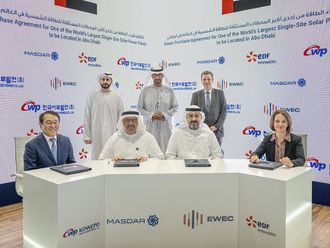Zimbabwean President Robert Mugabe has urged the global energy leaders to challenge the energy imbalance in which the people of the African continent remains at the receiving end.
Delivering a keynote speech at the African Energy Summit – part of the World Energy Forum, he called for harnessing global funds towards energy projects which could transform such marginalized communities.
“Africa’s marginalization in the global economy replicated itself as Africa’s marginalization on the energy front – both in the sense of production and consumption of energy,” he said.
“As with many other areas, Africa is a case of energy underconsumption. As with many other areas, we are exporters of primary energy commodity, which is why pipelines and ships daily cart crude from the continent for refinement elsewhere in the developed world, before the same commodity comes back to us as a huge fossil energy bill we can hardly afford.
“And yearly, the shocks arising from the price turbulence of that vital input on our economies are enormously ruinous to our people. Statistics on the world energy situation is very stark and clear. Among the world’s seven billion people, 1.5 billion are deprived of electricity.
“They destructively feed on the delicate environment as they desperately search for a wherewithal. The billion-strong African continent account for mere 3 per cent of global power consumption. Per capita electricity consumption in Africa, wer were told, is about 60KWh, compared to 8,000KWH in the United States.”
Aly Abou-Sabba, Group Operations Vice President of the African Development Bank (AfDB), noted that Africa was now in a position where it should be using its natural resources for accelerated wealth creation to bring about socio-economic transformation.
Africa is home to some of the world’s largest deposits of oil and gas, gold reserves and strategic minerals, such as uranium, cobalt and bauxite, and has an undeniable comparative advantage in natural resources.
“The challenge for the continent is how to govern and harness this rich pool of natural resources to achieve a broad-based growth,” he said.
He outlined three critical factors that must be in place for the continent to shift from being “resource cursed” to “resource blessed”: 1) Promoting responsible investment for broad-based growth; 2) Strengthening governance for enhanced transparency and accountability; and 3) Building capable and responsive states for human development and economic effectiveness.
Energy experts however, said the governments could unlock the hidden potentials of the African continent.
“Six of the world’s top growing nations are in Africa – which needs investment in power and energy sector,” said Frank Wouters, deputy director general of the International Renewable Energy Agency (IRENA). “Money is like water – it flows towards the bottom where there is less resistance. African leaders should remove obstacles so that the private sectors could invest in energy.”
Jamal Saghir, World Bank’s Director of Sustainable Development for the African Region, said, “Business as usual attitude will not work if renewable energy has to make a difference. Africa needs to develop 7,000 megawatts per year of power every year. However, it is adding less than 1,000 megawatts.
“We need to think big. Small is not beautiful when it comes to power and energy sustainability.”
Meanwhile, Mugabe stressed that solar energy presents enormous possibilities for humanity, particularly for the rural poor who exist outside national and international power grids.
“Indeed for us, the lack of progress on this potentially democratising source of energy ties up closely with the skewed model of global development which creates inequities at all levels of human existence,” Mugabe told delegates.
A forum like this should provide a strong voice for challenging such lopsided energy development, he said.
“We need to harness research towards the generation of green energy technology options which target rand reach the poor and marginalized,” he said.
Hinting at global economic power, Mugabe said, “We need not fear that the issues before us may question the way our world is presently structured, indeed how global power is arranged. We have long noticed that like all other issues, the energy is at the heart of global governance.
“Let us have the courage to point this out so that we do not end this with pious resolutions that shy away from core issues of global underdevelopment and global threats. That includes the right of nations to pursue peaceful nuclear options for energy generation.
“Today, the debate is poisoned by the issue of power rivalry. A forum like this should depoliticize this sensitive matter so we move ahead in concert,” he said.
He stressed the need to intensify investment in the energy sector which is beginning to constrain the industrialization possibilities as a regional block.
Reflecting on the Middle East and the Arab Spring, Mugabe said, “Apart from indicating how unilateral efforts at securing energy sources continue to shape global politics, the crisis in the Middle East dramatizes the inherent shared vulnerability of the world economy. We are all susceptible to serious shocks in the Middle East and the Gulf. We need to call for the stabilization of this vital sub-region, indeed call for the respect of its sovereign right to shape its politics.”












